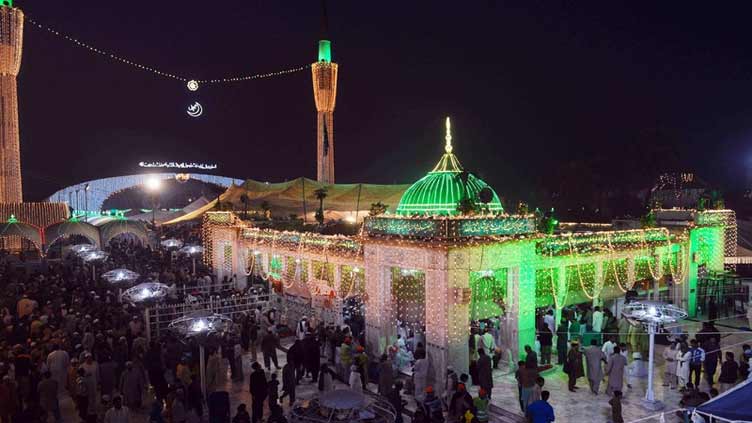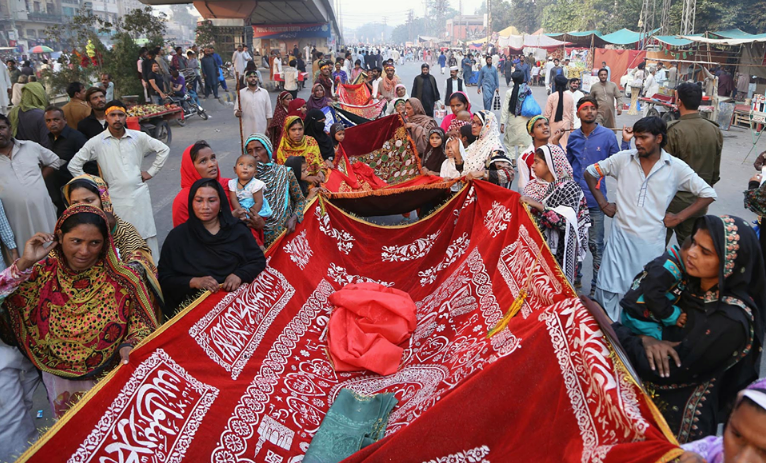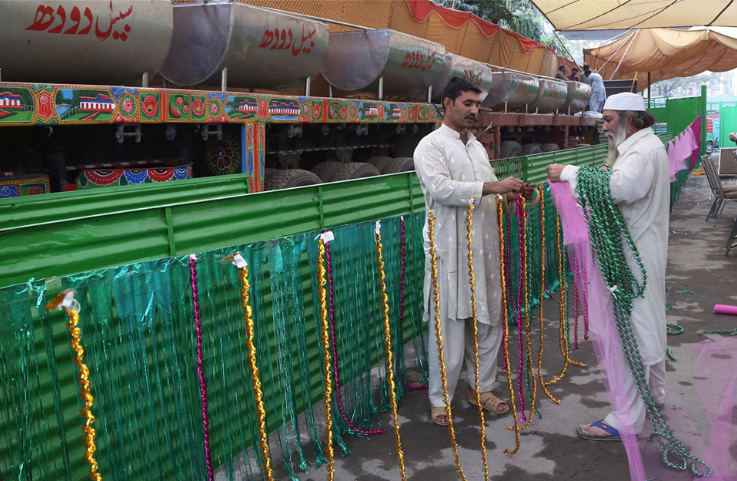Prayers and invocations

Pakistan
People from several parts of the country flock to the shrine to partake in devotional activities
By Salman Khan
LAHORE - A large number of people are expected to pay homage to Hazrat Data Ganj Bakhsh (RA) - the patron saint of Lahore - whose annual three-day Urs begins on Tuesday.
People from several parts of the country flock to the shrine to partake in devotional activities and invoke blessings of the saint.
Lahore is known as the city of monuments and among them the mausoleum of Hazrat Data Ganj Bakhsh holds special appeal for its people.

The magnetic pull
Is it the archaeological grandeur of the mausoleum that attracts people to the shrine from far and wide? Is it any temporal consideration?
The answer is an emphatic no.
So what draws droves of people to the three-day celebrations and what kind of atmosphere they find to perform devotional activities? Why, after all, they describe the event as an integral part of Lahore's culture?
The answer is that Data Sahib's shrine continues to be a centre of inspiration to which people flock not as part of a ritual but in the belief that it’s their duty. They find spiritual solace and consider the place a symbol of hope and harmony.

Also Read: Hazrat Data Ganj Bakhsh's Urs begins today
Devotional activities
The visitors to the shrine take part in devotional activities and offer prayers. Among the activities are recitation from the Holy Quran, Na’at Khwani and qawwali (poetry recital).
Supplication to the Almighty and prayers for grant of wishes amid the rose-scented fragrance make it a unique spiritual experience for those who flock to the shrine.

Most devotees consider the “chaddar-laying” tradition and showering rose petals on the silk-covered sepulcher a mark of deep respect for the saint and source of blessings.
In an aura filled with rose-scented fragrance they find solace and relief from worldly worries.
Besides (regular and occasional) visitors, many a faithful has found a permanent abode at the shrine. Among them are mendicants, the over-clothed and faith-healers.
The mosque inside the complex becomes a venue for special prayers and speech-sessions, where religious scholars highlight various aspects of the life of Hazrat Ali Hujveri with special focus on his masterpiece - Kashful Mahjoob.
This Persian book, it is said, reveals the mysteries of spiritualism and saint’s understanding of the Holy Quran, tradition, history, jurisprudence and logic.
Application of oil and water
One of the rituals on the Urs is application of oil that is heated in clay-lamps. People anoint themselves and their children with hot oil, which manifests their faith in the healing power the Higher Power has bestowed on Data Sahib.
They believe that the oil they use is a gift of the saint, which can rid them of physical handicaps and ill health.
Towards the north of the tomb is a receptacle for water. The devotees perform ablutions, apply the water to their eyes and limbs and take it to their homes for the sake of obtaining benedictions.
Milk Sabeel and dole-outs
Besides, distribution of free food, dole-outs and milk sabeel are an integral part of the event.

Day of days
As Thursday is considered a day of special significance among devotees, the shrine draws crowds from every nook and corner of Lahore and even some adjacent cities.
While some people turn up every Thursday to have their desires fulfilled by commemorating Hazrat Khwaja Mouinuddin Chisthi’s 40-day seclusion, others just take part in rituals that mean the whole world to them.
Devotional activities are at their peak on Thursday night just before the visitors lift their hands in prayers. Recitation from the Holy Quran, Na’at Khwani, qawwali and prayers are a source of tranquility and give people hope against their sufferings.
What scholars say
During the last many centuries historians and intellectuals have recorded the teachings and messages of the saint who, like all seers and sages, “interpreted Islam to people as a rational approach to better life in this world and hereafter.”
Sir Thomas Arnold observed in his well-known book “Preaching of Islam” that the propagation of Islam in the sub-continent was not achieved by those wielding political power but by saints. One can find copious instances in history books about Data Sahib’s power of persuasion and love for humanity that proselytized a large number of people to Islam. It is for these qualities that all communities including the Hindus and Sikhs embrace him.
In “Beloved City” - a collection of writings on Lahore - Bapsi Sidhwa writes about Data Sahib: “It is alleged that the saint saved Lahore during the ’65 and ’71 wars with India. Sikh pilots are believed to have seen hands materialize out of the ether to catch the bombs and gentle them to the ground. How else can one explain the quantity of unexploded bombs found in the area? They can’t all be blamed on poor manufacturing, surely.”
Official arrangements
Official of the Auqaf department say they make ample arrangements to facilitate the devotees which include some foreigners as well. They say special committees headed by notables look into various aspects of the Urs ceremony and bind the contractors not to overcharge the people and ensure other arrangements.
They say all possible security measures are ensured by installing closed-circuit television cameras and deploying regular police and volunteers who perform their duty day and night.

